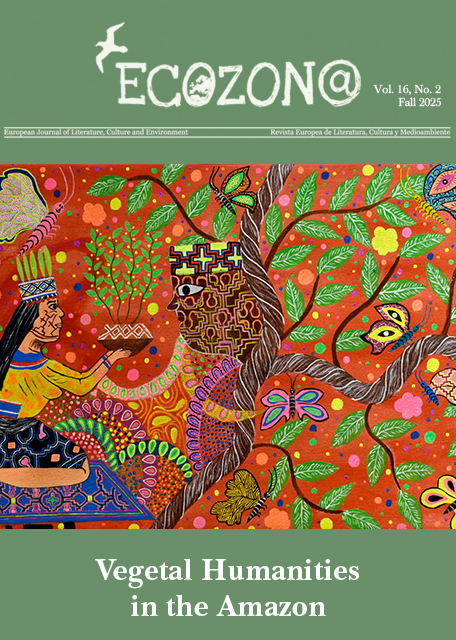Crossing the Borders: An Eco-cinecritical Analysis of Plant Wars and Bird Without Borders
DOI:
https://doi.org/10.37536/ECOZONA.2011.2.2.426Abstract
This essay reads two Asian nature-oriented films from the perspective of eco-cinecriticism, an ecologically minded film criticism. Plant Wars, produced by PTS Taiwan, questions the demarcation between native plants and exotic plants as well as between plants and human beings so as to remap the in-between border area. The storytelling method it applies is to feature 14 currently native plants as the main characters, and illustrates their relationship to aboriginal people, farmers, beekeepers and to other insect species. Bird Without Borders, also produced by PTS, tells the story of the migration journey of a group of black-faced spoonbills flying 16,000 kilometers all the way from Tainan, Taiwan, to Japan, along the border of South and North Korea, to a remote island of China to look for feeding places and then back to Taiwan to spend the winter. Different layers of border-crossing are shown in Bird. One similarity of these two PTS productions is the search for border-crossing so as to redefine or revise what the border means. Plant questions the biological categorization of the native plants and the exotic plants; Bird illustrates how the crew physically follows the route of the birds’ flight which crosses the national borders to provide a vision of remapping the natural territory through challenging the idea of a fixed “place.” Both are seeking for ways to trespass the man-made borders: Plant via environmental imagination; Bird via some physical movement. While the title of Plant Wars seemingly expresses its position more strongly through “wars,” Bird Without Borders explicitly asserts a dream of no borders.
Este artículo trata sobre dos películas orientadas a la naturaleza desde la perspectiva de la cinecrítica ecológica, una crítica cinematográfica con conciencia ecológica. Plant Wars, producida por PTS Taiwan, cuestiona la barrera que existe entre plantas nativas y plantas exóticas, así como entre plantas y humanos, para poder reclasificar las especies que se encuentran entre estas demarcaciones. El método narrativo que utiliza consiste en presentar 14 plantas nativas como protagonistas, y pone de manifiesto su relación con los nativos, los granjeros, los colmeneros y con otras especies de insectos. Bird Without Borders, también producido por PTS, cuenta la historia del viaje migratorio de un grupo de espátulas menores (Platalea minor) (black-faced spoonbills) que vuelan 16.000 kilómetros desde Tainan, Taiwán, pasando por Japón, a lo largo de la costa de Corea del Sur y Corea del Norte, hasta una remota isla de China para buscar alimento, y su vuelta a Taiwán para pasar el invierno. Bird muestra diferentes niveles de cruce de fronteras. Estas dos producciones PTS son similares en cuanto a la búsqueda de cruces de frontera para redefinir lo que significa frontera o límite: Plant cuestiona la categorización biológica de las plantas nativas y las exóticas, mientras que Bird utiliza el ejemplo de la tripulación que sigue físicamente la ruta del vuelo de los pájaros, que cruza fronteras nacionales, para dar una visión de reclasificación del territorio natural mediante el cuestionamiento de la idea de "lugar" fijo. Ambas películas buscan modos de cruzar las fronteras hechas por los hombres: Plant lo hace a través de la imaginación medioambiental y Bird por medio de movimientos físicos de diferentes tipos. Plant Wars parece expresar su posición de modo más fuerte, por medio de "guerras", mientras que Bird Without Borders trata de alcanzar una visión sin fronteras.
Downloads
##submission.downloads##
Pubblicato
Fascicolo
Sezione
Licenza
Authors who publish with this journal agree to the following terms:
a) Authors retain copyright and grant the journal right of first publication with the work simultaneously licensed under a Creative Commons Attribution License that allows others to share the work with an acknowledgement of the work's authorship and initial publication in this journal (CC BY-NC for articles and CC BY-NC-ND for creative work, unless author requests otherwise.
b) Authors are able to enter into separate, additional contractual arrangements for the non-exclusive distribution of the journal's published version of the work (e.g., post it to an institutional repository or publish it in a book), with an acknowledgement of its initial publication in this journal.
c) Authors are permitted and encouraged to post their work online (e.g., in institutional repositories or on their website) prior to and during the submission process, as it can lead to productive exchanges, as well as earlier and greater citation of published work (See The Effect of Open Access).










